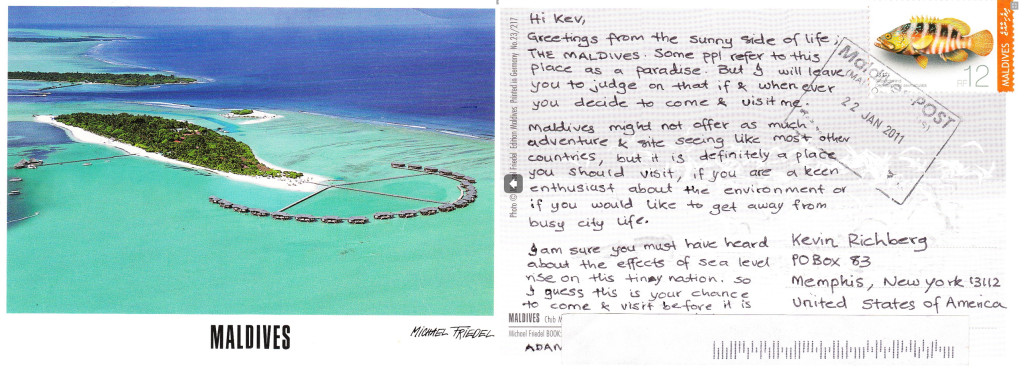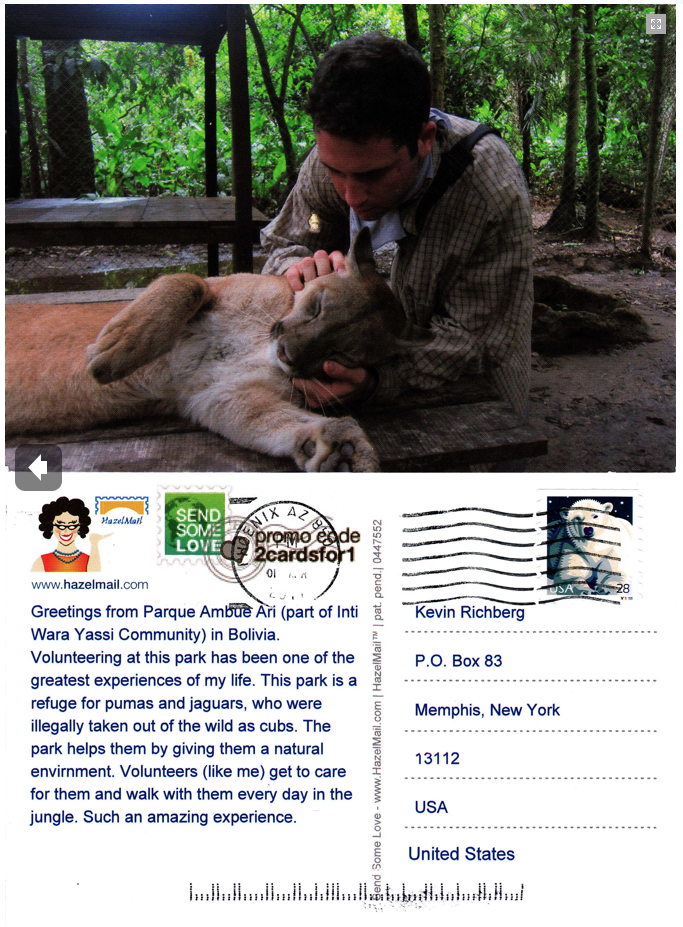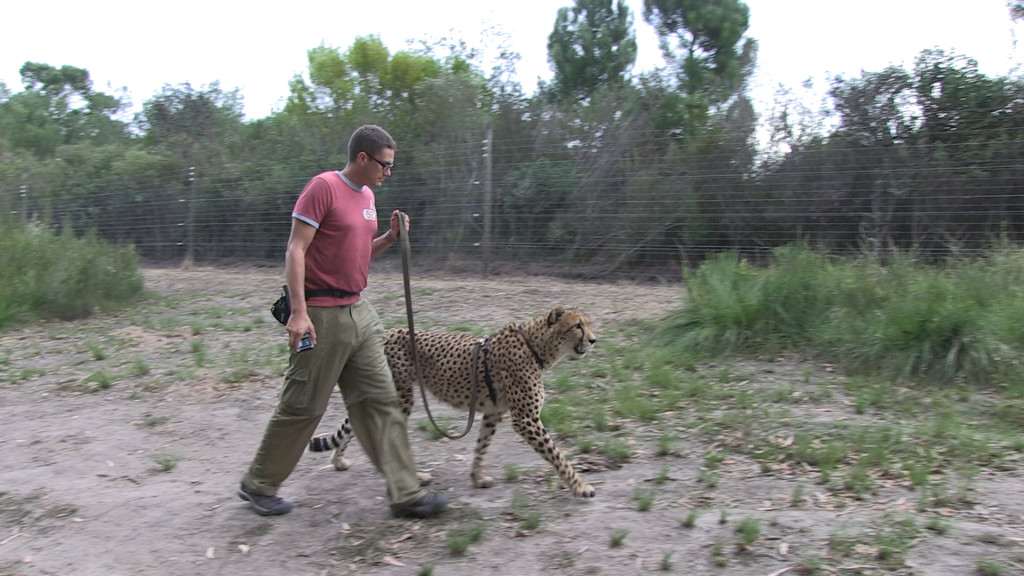The abyssal plain is an underwater plain on the deep ocean floor usually found at depths of 13,000 – 20,000 feet below sea level. The plains are among the flattest, smoothest and least explored regions on Earth.
Kevin Richberg has gazed into the abyss, literally (twice, from the Alvin submersible).
He’s been to 110 countries on six continents and spends eight months out of the year traveling the world. He is a contributor for Huffington Post, and has a masters of science in biological oceanography from the Massachusetts Institute of Technology. He is originally from Memphis, N.Y. and lives in Baldwinsville (rather, B’ville is his “base camp” when he’s not traveling).
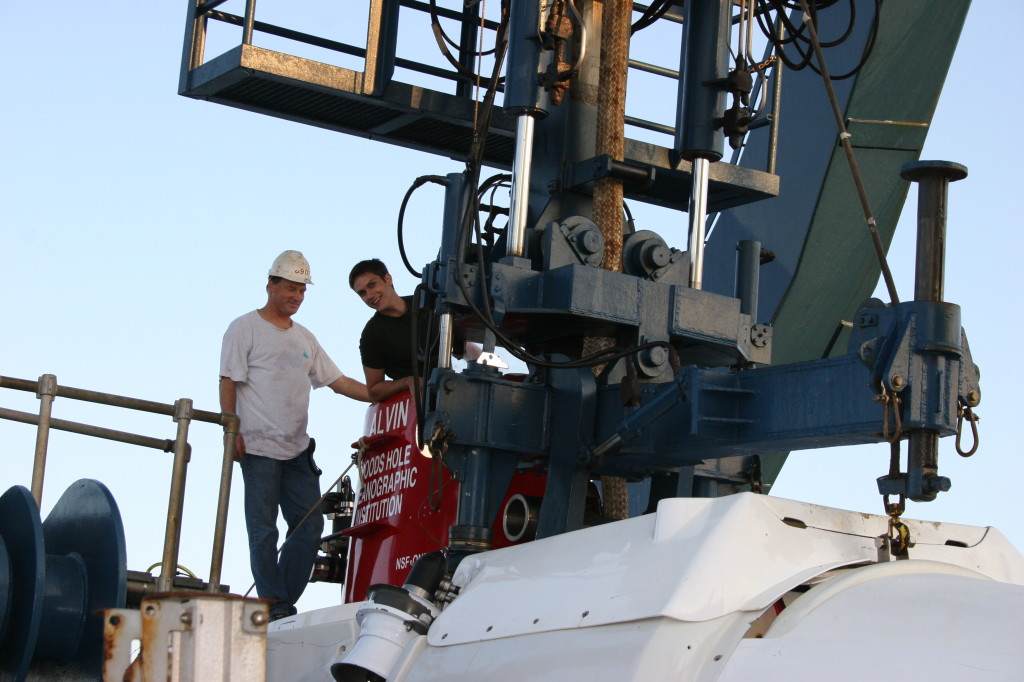
I recently sat down for coffee and a conversation with Kevin after learning, via Facebook, about one of his projects: “The 30 Postcards Project”.
“It’s about sending a written invitation across great distances”.
The 30 Postcards Project is a world-wide video series based on contributors who share an aspect of where they live, or a place they love via hand-written postcards. At the outset of the project, Kevin promised to travel to the origin of 30 of the postcards and to share the story of each place. The idea, which was crowd-sourced through Kickstarter in 2011, consists of mailing a handwritten postcard from anywhere in the world where you have a story to tell and sharing what you love about where you live with the rest of the world. Participants can write about “vacation spots, your home, a place you love or a place to avoid”. Kevin has received 7,000 entries from around the world, so far, and continues to receive more postcards each month.
“30 postcards was started from a very simple idea that I had while listening to an NPR program about the individual who started Post Secret” (Frank Warren), explains Kevin. “Instantaneously a seed was planted in my mind that if people were willing to send their secrets to a complete stranger, it would be so much easier for them to send something that made them smile, something positive, something postcards were, in fact, designed to do.”
By now, he’s filmed over 150 individual stories from all over the world (last count: 56 countries in the past two years) via The 30 Postcards Project. “It isn’t about there being 30 postcards out there. I had originally set out to pick 30, and I’m glad it evolved from that. The 30 Postcards Project “was something that gave it structure, and that structure was needed in the beginning. I brought the postcards with me, and captured far more stories than I set out to – and that was just in Europe.”
For example, Ulm is a relatively large city in Germany that few have heard about or even know exists – but the city’s claim to fame is it’s crowning glory: the highest medieval cathedral tower in Europe.
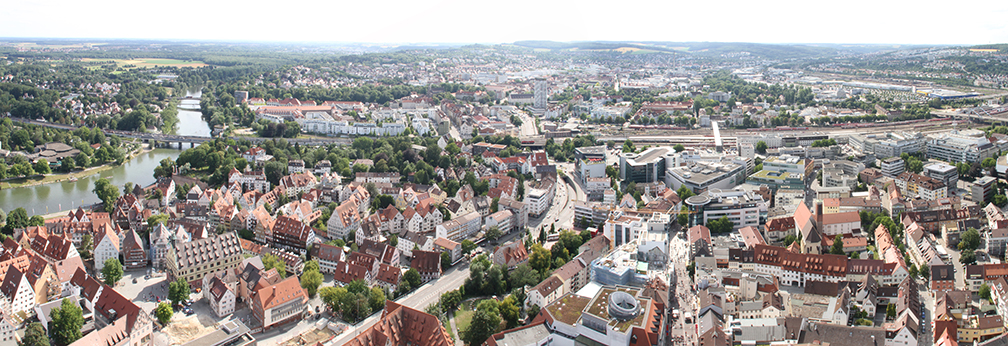
“It was on a postcard, and I was going from Zurich to Munich to film something purposeful in Munich, and I stopped in Ulm and did this story (about the Ulm Minster cathedral) based on a postcard, right on the spot.“

As little known as Ulm may be to the unseasoned traveler or amateur geographer, The 30 Postcards Project has a similar anonymous quality. Kevin has actually met very few of the original postcard sources because, as he describes: “people are not terribly thrilled about putting their contact information on a postcard – it’s just not something that people usually do – so very few came with contact information.” As this works, he went to the Maldives to do a lengthy piece on climate change. It was one of the very first postcards he received, and one of the first places he picked to visit.
The postcard said, in short: “I am sure you must have heard about the effects of the sea level on this tiny nation, so I guess this is your chance to come and visit before it is…” (the postage barcode covers the rest, but you get the idea).
Kevin is passionate about this trip: “The Maldives is the most endangered nation on the planet from climate change. As sea levels rise it will be the first country and people that will be completely wiped out. It is also a luxury travel destination with places that cost 10 thousand dollars a night to stay in. An entire culture, an entire people threatened with destruction, and it’s a playground for the ultra super rich – so there’s a really interesting dichotomy there. If you can get the ultra super rich to care about climate change, you might get them to care about a place they might like to keep.”
Kevin explains how the Maldavian government has bought a trust “to land in India with the possibility that they may have to move their entire population to higher ground.” The Maldives postcard sender had left his email address, but it turned out that the email was one he rarely checks – so Kevin never heard from him until he returned to the U.S., and while they’ve never had a chance to meet in person, they remain in contact and will be meeting via Skype before the piece is published later this year.
“Educate, Entertain, Inspire”
I couldn’t help but wonder if Kevin Richberg was the typical college grad who took “backpacking through Europe” or a “driving tour around the U.S” to the extreme. But he puts it simply: “It’s easier than people think, and that has become my mission now with the ongoing 30 Postcards Project – we educate, we entertain, we inspire.” What separates Kevin and the project from a lot of what you see in mainstream travel outlets (i.e. Discovery, Travel Channel) is that these mainstream outlets focus a majority of their efforts on entertainment, which Kevin describes as creating “an atmosphere to make it look like it is much harder than it actually is, which I take an enormous issue with because we are sold and more money is made for the outlets making money through the entertainment side of travel – entertainment means this is something you can’t do.”
![Maldives 1[3]](http://syracusenewtimes.com/wp-content/uploads/2013/12/Maldives-13-300x208.jpg)
The truth of travel is everything in between.
Kevin has never made a verbal or written agreement that he would ever show anything but the truth, and oftentimes the truth scares people more than traveling to exotic locations. So he’s only partnered with businesses “that agreed carte blanche to be represented in the way I saw them and I’ve always been honest about what I saw” – and while there’s “no crying in travel” – a postcard can lead to unexpected truths like Kevin’s near visit to Inta Wara Yasi – a controversial “wildlife refuge” in Bolivia that allows paying “volunteers” to walk big cats. After spending $5000 of project money and weeks of planning to get to Inta Wara Yasi, Kevin and crew had the rug pulled out from under them and asked to “leave immediately” by the president of the organization. Apparently a postcard can get you there, but the truth will still set you free.
Far different from the lion sanctuary Kevin visited in Zambia – which takes tourist dollars and puts it into lion conservation, or the same with the Cheetah walks in Tenikwa, South Africa, the difference is that Bolivia’s version “is some woman’s personal zoo, these are her pets – who collects money from travelers to spend time with her big cats – it is not open to the public, it is not open to tourism and it involves dangerous animals, lots of money and no vetting.” The New York Times did a piece and came out with a “we smell something isn’t right here” feeling and that’s what they published – and Kevin plans to release his version of this experience later this year.
“You can do this”
On his very first safari in Kenya, before he did travel for a living, an elderly American woman triumphantly announced: “I wanna see something other than elephants – we’ve seen too many elephants!” and that moment struck a chord with Kevin. It’s one of those stories he tells as a cautionary tale, and one that left a sour taste towards Americans and our travel habits. It was not until a few years later, during the 30 Postcards Project, he met a woman from New Jersey in Tandatula, South Africa, whose life dream was to go on safari. That year, she had received a Christmas gift from her family to do just that. “Every day here is a gift” he remembers her saying, and that despite the rain keeping most people in their tents, this woman didn’t let it stop her: “we saw rhinos today and it was my tenth time seeing rhinos, and I could go out to see them 100 more times” she told Kevin. “You got a glow off this woman” he describes “she was taking in every blade of grass, every bug – so many things the rest of us might be annoyed with, she was turning it into the best experience of her life – and she wiped forever the stain of the woman from Kenya who said she was over elephants.”
When Kevin speaks in these terms, or shares a story, whether in person or via one of his videos or articles, he is writing a postcard to the couple from Central New York who normally goes to Florida for vacation: “If you’ve got a enough money to go to Florida and go to Disney, you have enough money to do something far more exotic.” He is writing a postcard to the young professional who is saving up for their first vacation: “you can do this – If you can get yourself there, you don’t have to spend voluminous amounts of money to do things that you only think the ultra rich can do.” He is writing to the recent college grad planning to backpack through Europe: “I love to have people think outside the box – I don’t like that people think that Africa is out of their reach.”
He is writing a postcard to you.
For more information about The 30 Postcards Project – CLICK HERE



